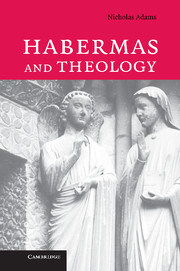Book contents
- Frontmatter
- Contents
- Preface
- 1 Religion in public
- 2 The ideal speech situation
- 3 Authority and distance in tradition
- 4 Sacred and profane
- 5 Universalism
- 6 Theology and political theory
- 7 Theology, social theory and rationalisation
- 8 Modernity's triumph over theology
- 9 Habermas in dialogue with theologians
- 10 Narrative and argument
- 11 Scriptural difference and scriptural reasoning
- List of references
- Index
3 - Authority and distance in tradition
Published online by Cambridge University Press: 23 December 2009
- Frontmatter
- Contents
- Preface
- 1 Religion in public
- 2 The ideal speech situation
- 3 Authority and distance in tradition
- 4 Sacred and profane
- 5 Universalism
- 6 Theology and political theory
- 7 Theology, social theory and rationalisation
- 8 Modernity's triumph over theology
- 9 Habermas in dialogue with theologians
- 10 Narrative and argument
- 11 Scriptural difference and scriptural reasoning
- List of references
- Index
Summary
I shall argue that religion and theology are casual victims of Habermas' account of tradition in modern society. Habermas elaborates – at some length – the role of religion in society, but this religion functions primarily as a kind of ancestor to modern forms of thought. More importantly, this ancestor appears as a highly idealised concept in Habermas' theory, and it is not obvious how this concept relates to the messy particularities of Christian and Jewish histories in Europe, or to other religious traditions worldwide. Habermas shows limited interest in religious life and thought for their own sake: he does not conceive his task to be showing how Jewish and Christian practice feeds into contemporary social life. Rather, he understands his task to be that of identifying and repairing problems in ‘post-traditional’ societies. The most obvious problem is that moral discourse is always tied to particular traditions, and yet these traditions need to negotiate in the public sphere. What criteria are to be used to evaluate their claims? What authorities are judged appropriate as courts of appeal? These are the questions Habermas investigates in his consideration of tradition, and these are the contexts in which discussions of religion and theology arise. These discussions are incidental to his main theoretical interests. We shall consider his detailed remarks on religion in the next chapter. This chapter will elaborate Habermas' understanding of the problems with tradition in modern societies, especially his debate with Gadamer over the authority of tradition.
- Type
- Chapter
- Information
- Habermas and Theology , pp. 49 - 65Publisher: Cambridge University PressPrint publication year: 2006

